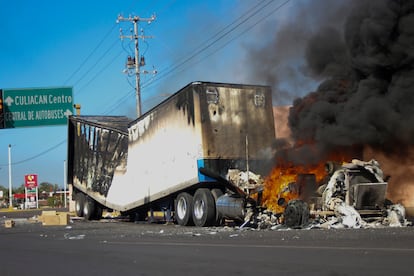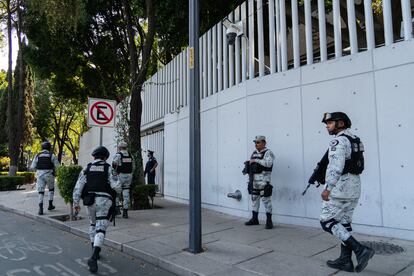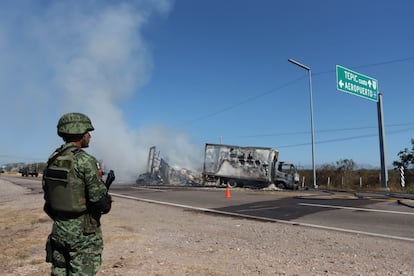Shootouts, burned-out cars and closed airports: Los Chapitos terrorize Culiacán after Ovidio Guzmán arrest
Violence swept across the state of Sinaloa after the son of ‘El Chapo’ was arrested and taken to Mexico City

Violence swept across the Mexican city of Culiacán on Thursday after authorities arrested Ovidio Guzmán, the son of drug kingpin Joaquín “El Chapo” Guzmán and one of the leaders of Los Chapitos, a faction of the Sinaloa Cartel led by El Chapo’s sons. Residents were advised to remain indoors as alleged members of Los Chapitos sought retribution for the arrest, blocking roads, stripping drivers of their cars and cellphones, and shooting at whim. Three airports in Sinaloa were closed, while many highways were blocked by burning cars and trucks.
Witnesses who spoke to EL PAÍS paint a picture of terror, where packs of armed criminals, on motorcycles or on foot, played cat and mouse with the authorities. Roberto, a painter who left home shortly before 10am on Thursday, said the criminals seized his car at gunpoint: “I don’t know what a war zone is like, but I think it’s the same thing,” he said.
The scenes were reminiscent of the violence that engulfed the city in 2019, when Ovidio Guzmán was captured for the first time. In that instance, Los Chapitos were able to force the withdrawal of the Mexican army, which had detained Guzmán at his home, in the center of Culiacán. Guzmán’s henchmen wreaked similar chaos, with the city hit by road blocks, burned-out vehicles and shootouts, until the military freed the criminal leader.

On this occasion, authorities were able to arrest Guzmán in Jesús Maria, a town half an hour away from Culiacán, and fly him to Mexico City. But the operation’s success has led to a terrorized city, with Los Chapitos’s violence bringing it to a standstill. Secretary of National Defense Luis Crescencio Sandoval told the media that the criminals had blocked up to 19 avenues and highways in Culiacán alone. The roads blocked are near the airport, a military air base and the north and south exists of the city.
Although the operation to capture Guzmán occurred at dawn, the drug cartel’s violent retribution had already begun by 6.15am. Juan (not his real name) arrived at Culiacán airport a quarter of an hour early to fly to Mexico City. He had passed the security controls and was waiting to board, when suddenly he heard shots.
“There have been like four or five bursts [of shots]. I asked myself, ‘What could it be?’ I went on Twitter to see if someone was reporting what was happening, and suddenly I see that they were already reports of road blocks, burned cars. And I said, ‘Oh no, this is already getting ugly.’ Then the plane arrived and we didn’t know if we were going to leave or not,” Juan explained. The airline workers made them board, but the plane remained on the runway. “People were already half paranoid,” he added. Finally, they took off.
Juan’s plane was one of the last to leave Culiacán airport, which later suspended operations. Videos later appeared on social media of workers and passengers running to take refuge in the terminal as shots are heard. One video even shows a shootout on the runway. In one of the most shocking videos, dozens of plane passengers are seen throwing themselves to the ground to avoid being shot. A commercial Aeroméxico plane and a military plane were hit by gunfire.

Meanwhile, Los Chapitos also took control of the streets. A journalist who lives near Malecón Nuevo, a neighborhood in the center of Culiacán, recalled waking up and reading several messages telling him not to go out. “They were talking about a clash in Jesús María, but I didn’t know what was happening,” said the journalist, who did not want to reveal his name for safety reasons. “In the morning, we received reports from colleagues who had their car stolen, and even their cellphones. There is a lot of uncertainty right now. After the arrest [of Guzmán], messages of looting and theft began to arrive,” he added.
Other journalists also ran into trouble while trying to report on what was happening. One reporter said that they took refuge in a hotel after criminals took away their car. The gang members later went to the hotel to demand guests hand over their car keys. Another journalist said that they had to work on foot after they too had their car stolen.
Roberto (not his real name) was another victim of armed robbery. He left his home at 9.40am. He had heard the reports on the news, but didn’t think they would affect him. He was wrong.
Roberto said he was attacked while driving down one of the city’s main avenues. “Suddenly, I see seven or eight guys standing in the middle [of the road], all bearing guns,” he said. “When I reach them, one says to me, ‘What’s up, where are you going?’ I tell him, ‘I’m going to work.’ And he tells me, ‘Get out and leave the keys.’”
Roberto got out of the car and stared at the criminals, not knowing what to do. A few meters away, neighbors watched what was happening. “The guy gets into my car, he seems nervous, he couldn’t start it, but then he does. Another guy who was outside goes to the two people who were watching and shouts, ‘What are you looking at?’ And he fires two shots into the air.”
Roberto ran to the onlookers, who gave him shelter. From their house, he saw the criminals drive his car in front of another and set it on fire.

Sign up for our weekly newsletter to get more English-language news coverage from EL PAÍS USA Edition
Tu suscripción se está usando en otro dispositivo
¿Quieres añadir otro usuario a tu suscripción?
Si continúas leyendo en este dispositivo, no se podrá leer en el otro.
FlechaTu suscripción se está usando en otro dispositivo y solo puedes acceder a EL PAÍS desde un dispositivo a la vez.
Si quieres compartir tu cuenta, cambia tu suscripción a la modalidad Premium, así podrás añadir otro usuario. Cada uno accederá con su propia cuenta de email, lo que os permitirá personalizar vuestra experiencia en EL PAÍS.
¿Tienes una suscripción de empresa? Accede aquí para contratar más cuentas.
En el caso de no saber quién está usando tu cuenta, te recomendamos cambiar tu contraseña aquí.
Si decides continuar compartiendo tu cuenta, este mensaje se mostrará en tu dispositivo y en el de la otra persona que está usando tu cuenta de forma indefinida, afectando a tu experiencia de lectura. Puedes consultar aquí los términos y condiciones de la suscripción digital.









































